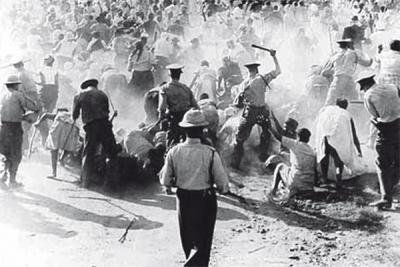The Day of the African Child (DAC) was initiated by the Organisation of African Unity (now the African Union) in 1991. In that year, a resolution was passed in commemoration of the 1976 protests by children in Soweto, South Africa, and to honour the memory of those who lost their lives during the protests. Those public demonstrations were essentially against the education system of South African during Apartheid rule.
Commonly known as the Soweto Uprising, it began on the 16th of June 1976 when thousands of high school students from Sowetan schools took to the streets to voice their discontent and disagreement with the introduction of Afrikaans as the medium of instruction in South African schools. Indeed, the Afrikaans Medium Decree of 1974 was to the effect that all Black schools were to use Afrikaans and English as languages of instruction. The reason behind such a move from the apartheid regime was that the apartheid system start to weaken and the use of Afrikaans experienced a decline as a result of decolonisation and independence of African countries and worldwide opposition to apartheid in South Africa. The apartheid government then decided to use a clause from the 1909 Union of South Africa Act recognising English and Dutch (later Afrikaans) as the official language to force through the 1974 Decree and impose Afrikaans as medium of instruction on Black children.
The 1974 Decree clearly was a move to further oppress Blacks, and this time in a more inhumane way as children were being targeted. In the words of Punt Janson, the then Deputy Minister of Bantu Education, a Black man may be trained to work on a farm or in a factory. He may work for an employer who is either English-speaking or Afrikaans-speaking and the man who has to give him instructions may be either English-speaking or Afrikaans-speaking. Why should we now start quarrelling about the medium of instruction among the Black people as well? … No, I have not consulted them and I am not going to consult them. I have consulted the Constitution of the Republic of South Africa …” On the 30th of April 1976, Orlando West Junior School in Soweto went on strike with the students refusing to go to school. Gradually, the protest gained momentum which heightened on the 16th of June 1976.
It was reported that not less than 20,000 Black students marched on the streets of Soweto to vehemently oppose the Apartheid system of education. Teachers, who were also part of the protest, had accentuated on the need for discipline and peaceful action. At the sight of police patrol, some students started to throw stones while others continue to march peacefully. The police then unleashed dogs towards the students as a reaction which to students started running and chaos ruled on the streets of Soweto. The police opted to use force and fire and the first shot was fired on Hector Pieterson, aged 13. Official government figures indicated that 23 students died whereas it was estimated that a minimum of 176 children lost their lives, the maximum shooting up to 700.
In the face of such atrocities, the United Nations Security Council passed the Resolution 392, condemning the incident and the apartheid government. Other major reactions followed such as United States Secretary of State, Henry Kissinger, stating that the event has casted negative light on South Africa and the exiled political opposition party, the African National Congress (ANC) demanded international action and economic sanctions on the apartheid government. June 16 is a public holiday in South Africa under the name of Soweto Uprising and Youth Day. On the continental level, the African Union celebrates the DAC on June 16. The African Committee of Experts on the Rights and Welfare of the Child, a committee specialised on children’s rights, celebrates the DAC every year with a theme that ensures the protection and promotion of children’s rights in Africa as guaranteed by the African Charter on the Rights and Welfare of the Child. This year’s theme is “A child friendly, quality, free and compulsory education for all children in Africa”.
Children are the future of tomorrow and catering for their well being and development is synonymous with a better tomorrow. The DAC is a day to celebrate the child. in Mauritius, the 16th of June will be marked by the launching of the Child Protection Register, an innovative project designed to provide an integrated database to record all cases of children in distress that are reported to the Child Development Unit of the Ministry of Gender Equality, Child Development and Family Welfare. However, it is observed that not many Mauritians are aware of the DAC and the importance to commemorate the Soweto Uprising, draw lessons from it and ensure a better future of our children.
Emerging Mauritius, a platform that fosters sharing of knowledge and social actions, has noted the importance of the DAC and the necessity to sensitize Mauritians on children’s rights and welfare. This article is a humble effort to sensitize Mauritian on the DAC. On a concrete note, Emerging Mauritius is also organising an event on the 14th of June 2014 at La Rosa Social Welfare Centre with recreational activities and free medical check up as we believe that, “There can be no keener revelation of a society’s soul than the way in which it treats its children” – Nelson Rolihlahla Mandela.
The Soweto Uprising
- Publicité -
EN CONTINU ↻


